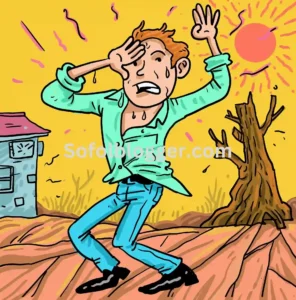As temperatures soar and the sun beats down relentlessly, communities worldwide face the looming threat of heatwaves. Defined as prolonged periods of excessively hot weather, heatwaves can pose serious health risks, especially for vulnerable populations. Understanding what a heatwave is and how to protect yourself is crucial for staying safe during these extreme weather events.
Read About What is FTP Server?

What is a Heatwave?
A heatwave is a prolonged period of excessively hot weather, typically accompanied by high humidity and minimal precipitation. These weather phenomena can occur in various regions around the world and are often characterized by temperatures significantly above average for the particular season and location. Heatwaves can vary in intensity and duration, ranging from a few days to several weeks.
Causes of Heatwaves:
Heatwaves can be triggered by a combination of meteorological factors and geographical features. Some common causes include:
High-pressure systems: During a heatwave, large high-pressure systems can linger over a region, trapping warm air and preventing the dispersion of heat.
Urban heat island effect: Urban areas with extensive pavement and buildings can absorb and retain heat, exacerbating temperatures and prolonging the duration of heatwaves.
Climate change: Rising global temperatures due to climate change are contributing to the frequency and intensity of heatwaves, making them more common in many parts of the world.
Weather patterns: Changes in atmospheric circulation patterns, such as the jet stream, can lead to stagnant weather conditions, amplifying the effects of heatwaves.
Health Risks of Heatwaves:
Heatwaves can pose significant health risks, particularly for vulnerable individuals such as the elderly, children, pregnant women, and those with pre-existing health conditions. Some common heat-related illnesses include:
Heat exhaustion: Symptoms include heavy sweating, weakness, dizziness, nausea, and headache.
Heatstroke: A life-threatening condition characterized by a body temperature above 104°F (40°C), accompanied by confusion, rapid pulse, and loss of consciousness.
Dehydration: Prolonged exposure to high temperatures can lead to dehydration, which can cause fatigue, dizziness, and confusion.
Exacerbation of existing health conditions: Heatwaves can worsen symptoms for individuals with respiratory diseases, cardiovascular conditions, and other chronic illnesses.
Tips for Staying Safe During Heatwaves:
To protect yourself and your loved ones during a heatwave, consider the following precautions:
Stay hydrated: Drink plenty of water throughout the day, even if you do not feel thirsty. Avoid excessive consumption of caffeine and alcohol, as they can contribute to dehydration.
Stay indoors: Whenever possible, stay indoors in air-conditioned or well-ventilated spaces during the hottest parts of the day.
Dress appropriately: Wear lightweight, loose-fitting clothing and a wide-brimmed hat to protect yourself from the sun. Use sunscreen with a high SPF to prevent sunburn.
Keep cool: Use fans, take cool showers or baths, and use ice packs or wet towels to lower body temperature.
Limit outdoor activities: Minimize outdoor activities, especially during peak heat hours, typically between 10 a.m. and 4 p.m.
Check on vulnerable individuals: Keep an eye on elderly relatives, neighbors, and those with chronic illnesses to ensure they are staying cool and hydrated.
- Never leave children or pets in parked vehicles: Temperatures inside a parked car can rise to dangerous levels rapidly, leading to heat-related illnesses or death.
Heatwaves are a serious weather phenomenon that can have profound health impacts on individuals and communities. By understanding the risks associated with extreme heat and taking proactive measures to stay safe, you can mitigate the dangers posed by heatwaves and protect yourself and your loved ones during periods of high temperatures. Stay informed, stay hydrated, and stay cool to weather the heatwave safely.
শেয়ার করুন:










